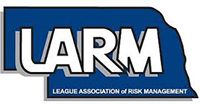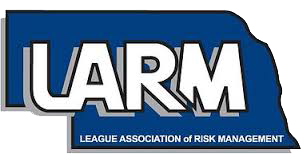Frequently Asked Questions about LARM

What is LARM?
LARM (League Association of Risk Management) is a risk management provider that offers coverage and risk management services to Nebraska cities, villages and other governmental agencies. It is made up of over 220 Nebraska governmental entities who have joined together through an interlocal agreement to insure each other.
Who can belong to LARM?
Any Nebraska governmental agency
Who belongs to LARM?
Members of LARM include: Cities, Villages, Sanitary Improvement Districts, Departments of Public Works, Fire Protection Districts, Solid Waste Agencies, Townships, Natural Resource Districts, Landfills, Rural Fire Districts, Economic Development Districts - Here's the complete list.
When was LARM established?
In 1989, LARM offered an insurance program for municipalities. In 1995, 13 municipalities joined together to form the Property and Liability Group Self-insurance Pool. The Workers Compensation division was introduced in 1997.
Why was LARM started?
In the 1980’s public entities faced an insurance crisis. Rates were skyrocketing, and some municipalities’ policies were being canceled completely. A study completed by the League of Nebraska Municipalities determined that since the availability of insurance carriers and products to Nebraska Municipalities was limited, a group of local governmental agencies would form their own insurance pool (LARM).
Is belonging to a governmental pool a common practice?
Yes, 85% of all local governments across the United States are in a governmental insurance pool.
How is LARM governed?
LARM is governed by a Board of Directors made up of representatives consisting of elected and appointed officials that are elected by the LARM membership. An executive director manages its operations.
Is LARM approved by the State of Nebraska?
Yes, LARM was established in 1995 under the Nebraska Intergovernmental Risk Management Act and is regulated by the Nebraska Department of Insurance.
Is LARM considered an insurance agency?
No, The Nebraska Intergovernmental Risk Management Act (IRMA) states that pools are not considered insurance companies. Pools do have their own set of regulations and the Nebraska Department of Insurance regulates how public pools maintain reserves, pay dividends and pay claims.
How many public pools are there in the United States?
There are more than 500 governmental risk pools in the U.S. with new pools starting up every year and participation rates rising.
Has any pool ever failed?
No pool has ever failed to pay its obligations since the first public pool began in 1974.
What kinds of insurance coverage does LARM offer?
LARM provides insurance coverage for Workers Compensation, Property (Building/Contents and Inland Marine), Boiler and Machinery, General Liability, Public Officials Liability, Law Enforcement Liability, Public Officials Employment Practices Liability, Employee Liability, Employee Benefits Liability, Excess Liability, Automobile Liability/Physical Damage, and Crime (Money and Securities).
What optional types of insurance coverage does LARM offer?
LARM provides additional insurance coverage for Liquor Liability, Special Events, Employee Dishonesty/Crime Coverage, Accidental Death and Dismemberment (volunteers), Canine, Sewer and Skateboard.
Does LARM review coverage of its members on a regular basis?
Yes, LARM provides an annual coverage review for each member to explain coverage and review the insurance schedule. Insurance coverage reports are also provided annually for members.
What other services does LARM provide?
LARM will provide contract reviews and suggest risk transfer techniques. They are on call during regular business hours for any insurance question and are available after business hours on a limited basis. They also provide speakers on various topics, training, and assistance on claims.
Does LARM provide safety training?
Yes, LARM provides occasional on-site risk management training for department heads, supervisors and staff. Regular safety newsletters and tips are also sent monthly to LARM members. Nationally known speakers are contracted on a regular basis for LARM members at conventions and workshops across the state.

